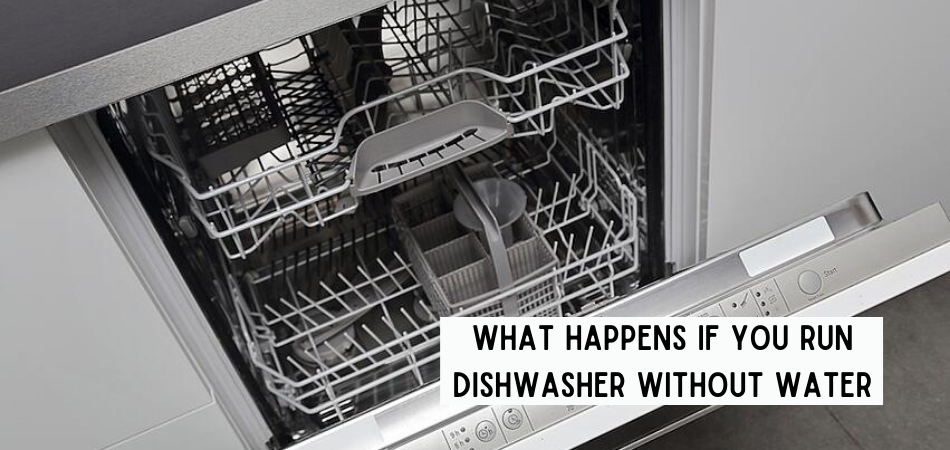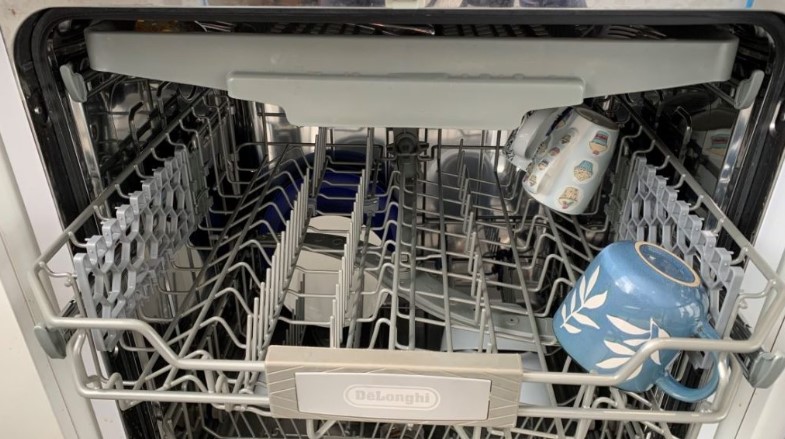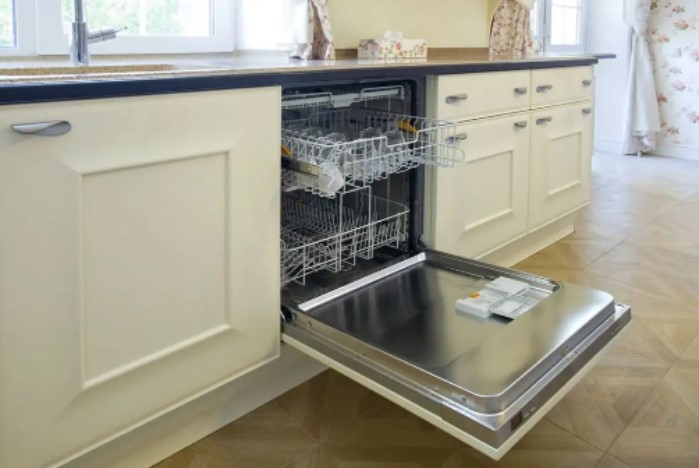If your kitchen happens to handle a lot of cooking, then you know the importance of a dishwasher. I consider it the most essential kitchen appliance. Sometimes, it’s even impossible to run a busy kitchen without a dishwasher. However, there are several things to know about this crucial appliance.
For example, what happens if you run dishwasher without water? If you run a dishwasher without water, you’ll damage its pump and heating element. The dishwasher might also stall when you need to use it the next time. While these effects might not cause permanent damage, they might reduce their lifespan.
This is because water is crucial in the dishwasher cleaning process. Keep reading below as I discuss more using a dishwasher without enough water.
Contents
What Happens If You Run Dishwasher Without Water?
If you run a dishwasher without water, then you’re likely going to damage your dishwasher. There are two parts of the dishwasher at the highest risk of damage while running it without water. These are:
Heating element: The dishwasher will encounter some damage and reduce its performance over time. Remember, hot water is necessary for efficient dish cleaning. Water on the basin at the bottom of the dishwasher is usually heated to 130-140 degrees F by the heating element.
Running the dishwasher without water is like turning on the heating element without anything to heat.
Pump: The second part is the pump which will slowly degrade when running without water, and it will gradually reduce its lifespan. When there is no water passing through the pump, a high surge of power could damage the pump.
Running a dishwasher without water is poor practice. You’ll be reducing the overall lifespan of the dishwasher. The dishwasher will age fast, and you’ll not get good value for your money. Furthermore, you’ll be wasting electricity as it does no cleaning.
Dishwashers are expensive and need to be used carefully. You need to read the dishwasher manual and follow the operating instructions.
Running a dishwasher without water can happen when people forget to turn on the faucet to the dishwasher. You might realize the dishes did not get very clean afterward. The first area likely to suffer damage is the pump to the motor seal.
The pump can burn if you run a dishwasher without water for extended periods. The heating element can also be badly damaged. Water is needed for the dishwasher to run smoothly and clean dishes.
Overall, running a dishwasher without water is bad practice. But one might ask, can a dishwasher turn on without water? Most dishwashers will not turn on where there is no water. This is a safety feature designed to prevent using a dishwasher without water. There is a water level control float that prevents it from turning on.
However, you’ve probably turned your dishwasher on without water. This happens when the dishwasher stalls. If the dishwasher is running and then shut off, the water will drain. And if the dishwasher stalls, it will turn on even without water.
How Do I Turn On/Off Water To The Dishwasher
You need to locate the hot water faucet that takes water to the dishwasher. The hot water supply pipe is usually found under the sink. Check and see a pipe that branches towards the dishwasher.
Once you find the pipe, there is a faucet that you can use. Turn the faucet in a clockwise direction to turn on the water and in an anticlockwise direction to turn off the water.
Can You Use A Dishwasher With Low Pressure Of Water?
A dishwasher can run with low-pressure water. However, the better question is whether a Low Water Pressure Dishwasher can clean dishes perfectly. Well, it depends on the dishwasher model.
In the past, only high-pressure dishwashers were available. However, technological advancements have led to low water pressure dishwashers that are sustainable and more environmentally friendly.
Older model dishwashers use mainly high pressure. However, low pressures will not clean as efficiently as high pressure. It’s just science. Higher pressure can clean the most stubborn dirt and stains on dishes.
It all comes down to your dishwasher brand. Nowadays, the latest dishwasher models feature low water pressure cleaning. If you happen to have a newer dishwasher model, then it can clean your dishes just fine.
But the cleaning comes down to the exact pressure amount and how dirty the dishes are. It’s never a big deal when it comes to pressure. The recommended dishwasher pressure for efficient cleaning is 20 PSI to 120 PSI. As you can see, the pressure range is quite huge. Dishwashers don’t require a specific pressure amount to be sensitive and work.
However, when the water is low, it will flow slowly and might not fill the machine. What happens? The dishes won’t get cleaned as you would want.
What’s more, low water pressure can increase the cleaning cycle. This is because it takes more time for the water to fill the drum. So, it’s possible to run a dishwasher with low water pressure. However, the results won’t be as effective as when it’s under high pressure.
Dishwasher water pressure is crucial and can influence the cleaning performance. Technically, the dishwasher will run, but the dishes won’t be that clean.
Low water pressure below 20 PSI can be due to blocked valves or blockage in the pipelines. You can increase the water pressure by cleaning the faucets and unblocking pipelines.
How Do You Know If Your Dishwasher Is Getting Enough Water?
It’s never a big question that should worry you. Dishwashers are designed to fill water automatically. When water fills up during a washing cycle, a small plastic will float on top. The float features a switch at the bottom of the basin that signals the water inlet that water is full.
This will automatically shut the water inlet valve. However, if you sense the dishwasher is not getting enough water, there is a way to check that. Before starting any checks, unplug the dishwasher to prevent electrocution.
You can check if the dishwasher is getting enough water through the following steps:
- Empty the dishwasher
- Turn it on and set the run cycle
- Let the dishwasher fill with water as it normally does
- Once full, the dishwasher will start the cycle
- As it starts the cycle, turn it off and open the door. Check the water level,
- The water level should fill just under the heating element.
This is how to know if the dishwasher is getting enough water. If the water is below the heating element, then it’s not getting enough water. Fill the small bucket with water manually and flip it. You can then shut the door and let the machine run.
Final Thoughts
Well, that’s it from me! You now know what happens if you run dishwasher without water. The dishwasher needs water to clean the dishes. Without water, you’ll end up damaging the pump and heating element. Make sure the water inlet to the dishwasher is not blocked and water fills the bucket inside.
Dishwashers are expensive and must be used accordingly. Make sure they run with enough water to avoid reducing their lifespans.




